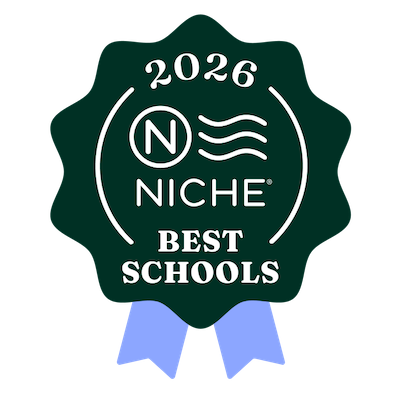Academics & Arts
Early Childhood School (18 mos-PreK)
Prekindergarten
Laurel’s Prekindergarten gives children the tools and the license to become independent thinkers and risk-takers – essential to developing self-confidence, decision-making and problem-solving skills and self-reliance.
We build on what children know and strengthen attitudes about themselves as capable, active learners and valuable group members. Children are encouraged to develop meaningful connections with the world around them, which inspires them to care for their community and themselves.
We build on what children know and strengthen attitudes about themselves as capable, active learners and valuable group members. Children are encouraged to develop meaningful connections with the world around them, which inspires them to care for their community and themselves.
Prekindergarteners happily choose from an array of developmentally appropriate activities and materials that promote cognitive, creative, physical, emotional and social growth. Students are often involved in the planning process and make their own choices, with teachers as guides and facilitators. The curriculum encourages cognitive language and math skills in a fun and integrated setting, ensuring that each child is prepared for Kindergarten the following year.
List of 4 items.
-
Language Arts
Skills- Continued development of literacy
- Verbal expression
- Listening comprehension
- Letter and word identification
- Writing process and applications
Content- Exposure to and enjoyment of books and stories
- Contextual understanding
- Recognizing the difference between fiction and non-fiction
- Developing research skills
- Retelling of stories
- Using language for self-expression and negotiation
- Formulating questions and using descriptive language
- Mastering receptive language skills by following directions
- Developing phonemic awareness
- Recognizing the alphabet and high frequency words and names
- Understanding words are made up of letters
- Counting and understanding syllables
- Recognizing upper case letters and some lower case letters and some beginning letter sounds
- Recognizing written symbols
- Understanding print has meaning
- Journaling
- Using writing instruments correctly and writing his or her name
-
Social Studies
Skills- Understanding diversity
- Socialization
- Geography
- Understanding communities
Content- Developing an awareness of and respect for differences and commonalities among cultures
- Respecting others’ thoughts, ideas, likes, dislikes and abilities
- Mastering socialization and interpersonal skills
- Conflict management
- Negotiation of space, sharing and understanding the concept of being a friend
- Conquering separation from caregivers
- Developing independence, responsibility and self-help skills
- Understanding of maps and the globe
- Discussing neighborhoods, natural resources and habitats
- Understanding of community services, membership and roles within various smaller and larger communities.
-
Mathematics
Skills- Patterning
- Graphing
- Measurement
- Geometry
- Estimation
- Grouping
- Number recognition
Content- Talking about mathematics with sentences
- Understanding and solving simple mathematics problems and symbols
- Using manipulatives, puzzles, blocks and other 2- and 3- dimensional objects to understand how things work in relation to each other and in space
- Understanding how to portray and read information using a graph
- Recognizing patterns and numbers
- Developing a sense of time, and sequencing
- Using standard and non-standard units of measurement through cooking, estimation and predictions
- Using words to compare objects (i.e. bigger, smaller, over, under), length and capacity
- Matching, sorting and identifying shapes
-
Science
Skills- Sense of place
- Understanding life cycles and seasonal changes
- Environmental stewardship
- Experimentation
Content- Exploring the natural world and habitats
- Observation and documentation
- “Backyard” study, becoming familiar with native plants, animals and ecosystems
- Fostering curiosity
- Patterning and predictable sequencing
- Understanding lifetimes and life spans
- Studying hibernation and migration
- Understanding human and animal survival techniques
- Describing, observing and predicting the weather
- Developing stewardship and care of the earth and understanding what is healthy for various habitats
- Recycling, composting and conservation
- Gardening and using the greenhouse
- Learning about litter pick-up and landfills
- Understanding the concept of linked ecosystems and cause and effect on each
- Making predictions, observations and hypotheses
For more information about Laurel's Early Childhood School, please contact the Admissions Office at admissions@LaurelSchool.org or 216-455-3022.
Lyman Campus | Laurel School
1 Lyman Circle
Shaker Heights, OH 44122
Phone: 216-464-1441
Admissions: admissions@LaurelSchool.org
General: info@LaurelSchool.org
Shaker Heights, OH 44122
Phone: 216-464-1441
Admissions: admissions@LaurelSchool.org
General: info@LaurelSchool.org
Butler Campus | Laurel School
7420 Fairmount Road
Novelty, OH 44072
Phone: 216-464-1441
Admissions: admissions@LaurelSchool.org
General: info@LaurelSchool.org
Novelty, OH 44072
Phone: 216-464-1441
Admissions: admissions@LaurelSchool.org
General: info@LaurelSchool.org
© 2025 Laurel School. All Rights Reserved.













